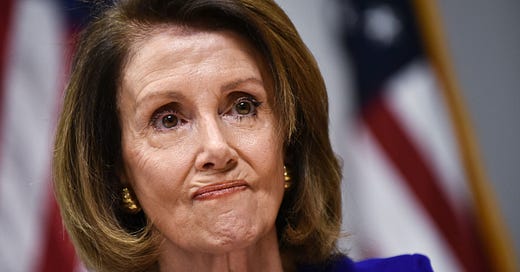
Continue the Investigation. Begin the Impeachment.

The most compelling evidence for impeachment is now in the public record. White House Counsel Pat Cipollone’s refusal to cooperate with the House’s impeachment inquiry is an attack not on its recipients—House Democrats who, through a process of legal alchemy, he accuses of violating phantom processes—but rather on the relationship between Congress and the executive branch. President Donald Trump is now claiming for himself and, crucially, future presidents, the authority to determine the legitimacy of legislative oversight.
House Speaker Nancy Pelosi’s response was to promise that the president “will be held accountable.” This makes impeachment retributive, a legislative referendum on the bitterly contentious topic of the individual who now occupies the office.
A better response would have been that the constitutional structure will be vindicated. Because Cipollone’s letter is a broadside against the system of checks and balances itself.
Impeaching the president for this extraordinary claim of executive authority would have three important advantages:
First, impeachment would pertain to constitutional issues rather than what have always been the most divisive and least persuasive grounds: the tawdriness of Donald Trump.
Second, rather than punishing an individual—which would conflate impeachment, a political process, with criminal law—such an impeachment would seek to protect the separation of powers by chastening future presidents and emboldening future legislators. By contrast, if the letter goes unchallenged, it will seep into the groundwater of precedent and be drawn upon by future presidents.
Finally, the evidence, signed by the president’s lawyer and released by the White House into the public realm, is indisputable.
Cipollone’s letter is a game-changer precisely because it is not about the president’s conduct—which Democrats are always primed to attack and which Republicans are forever willing to excuse. It sweeps away the clutter of Trump’s outsized personality to clarify the constitutional stakes. In that sense, the letter is not a constitutional crisis. It is a constitutional opportunity.
To be sure, the charge that the president asked the government of Ukraine to give him personal political favors is serious. Proving it also requires overcoming presidential stonewalling, building a carefully-constructed case on the model of criminal law, and relying on dozens of Republicans to reverse positions they have already taken publicly.
The time required—including pursuing subpoenas in a slow-moving judicial system—would take the investigation into the prime of the 2020 election season or, worse, beyond it, opening Democrats to charges of electoral motives. The Ukraine accusation, which deals fundamentally with President Trump’s conflation of his personal interests with those of the nation, is arguably best settled by the people’s votes, not their legislators’.
By contrast, on the basis of Cipollone’s letter alone, the House could immediately debate articles of impeachment rooted in abuse of power and obstruction of Congress. That would clarify the question for Congressional Republicans, which is not whether they are willing to apologize ad infinitum for President Trump personally—they are—but rather whether they are willing to go on record as foregoing their power of oversight of future Democratic administrations. Democrats will eventually occupy the White House and Republicans will eventually control the Congress. Whether that happens in 2021 or beyond is not the point. The survival of congressional oversight is.
The stakes are no less than that. The important fact about the Cipollone letter is not that it concocts legal grounds for resisting the House inquiry but rather that it reserves for presidents the right to judge whether impeachment proceedings are legitimate. Is there a circumstance in which a future president would acknowledge that they are?
That those in power will someday find themselves in opposition—and consequently should make decisions on the integrity of institutions rather than the behavior of individuals—is both one of the most important, and one of the most easily forsaken, tenets of constitutionalism.
Democrats forgot that principle with respect to President Obama’s assertions of unilateral executive authority over domestic issues such as health care and immigration. Yet some of the president’s most shameless apologists have retained a residue of institutional concern. Senate Majority Leader Mitch McConnell, for example, has defended the legislative filibuster on the grounds that Democrats are using it today, but Republicans may need it tomorrow.
A charge of obstruction of Congress would compel senators like McConnell to weigh the same considerations with respect to Congressional oversight. Is protecting this president today—an individual whose four-year term is a fraction of the Constitution’s centuries—more important than preserving Congressional power for all time? Could, for example, the Benghazi investigation have occurred at all if President Obama had been able to withhold the testimony of Senate-confirmed officials or documentary evidence on the claim that the process was partisan?
That presidents and legislators—especially senators—are chosen on different electoral clocks helps force these considerations. A senator elected alongside President Trump in 2020 will serve two years beyond his term and consequently should consider constitutional issues on a time horizon that exceeds one administration.
Oversight of the administration’s antics in Ukraine can continue, of course. But the obstruction case is ready for trial. The evidence is indisputable, and indisputably clarifying.
What is on trial is not the transient fabulism of Donald Trump but rather the enduring architecture of the Constitution.









